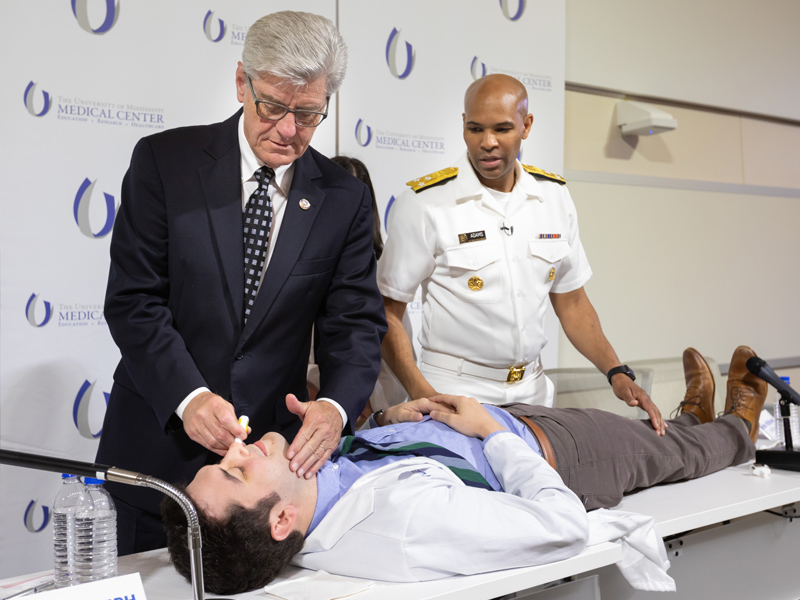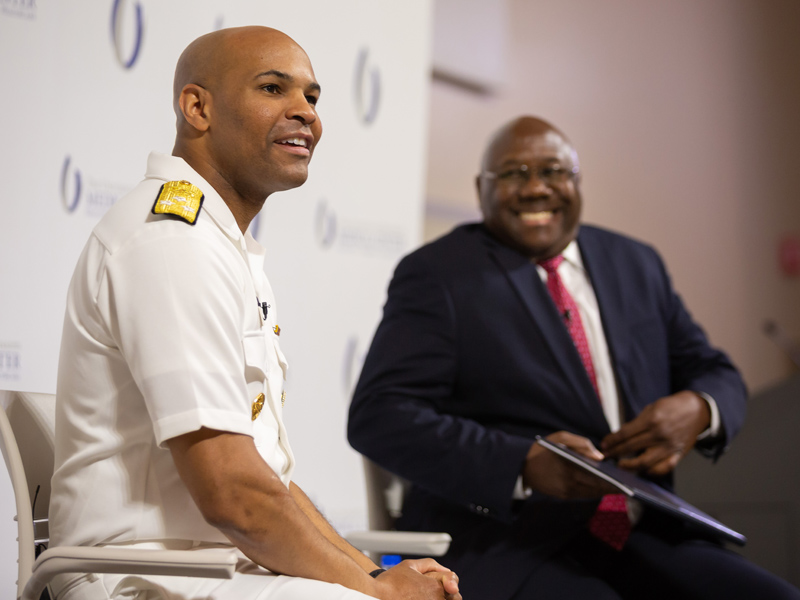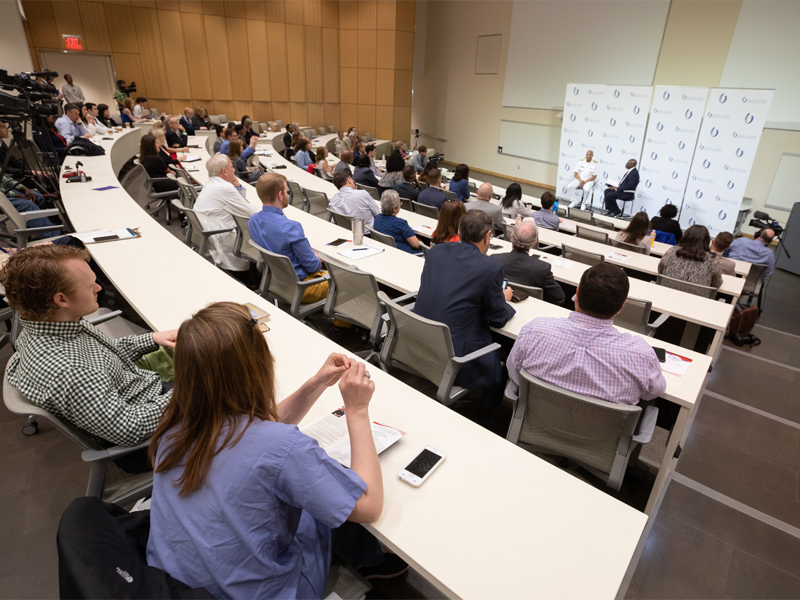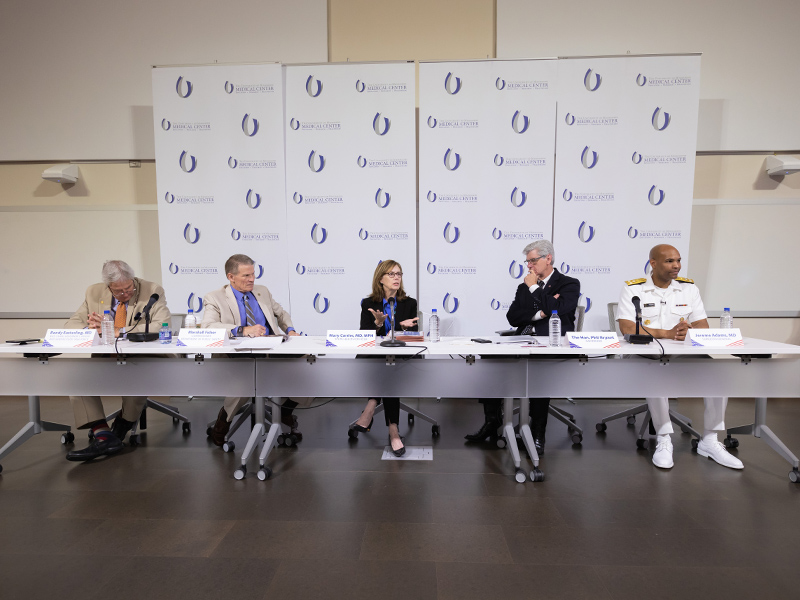Surgeon General: Agency cooperation, use of opioid-reversal drug can stem epidemic

Public health strategies to reverse the national statistic of a death from opioid overdose every 12½ minutes are a work in progress, but there’s a way at your fingertips to potentially save some victims now, one at a time.
Carry the opioid-reversing drug naloxone with you. Carry it all of the time, no matter who you are, and no matter where you are. And demand it be available at your neighborhood pharmacy.
“It takes about four minutes before irreversible brain injury from an opioid overdose happens. Anyone ever see an ambulance arrive in four minutes?” Dr. Jerome Adams, the nation’s 20th U.S. Surgeon General, asked Thursday during a visit to the University of Mississippi Medical Center.
“I carry it with me all the time in my bag,” Adams said of naloxone, available in a nebulizer mist or by injection. “Any one of you can stabilize someone. Anyone in your community can be a lifesaver.”
And for that to happen, attitudes must change, the stigma attached to opioid addicts must be shattered, and communities must form partnerships so that everyone is on the same page, said Adams, a board-certified anesthesiologist. He visited UMMC at the invitation of Dr. Claude Brunson, a fellow anesthesiologist and the Medical Center’s senior adviser to the vice chancellor for external affairs.

Adams, who took part in a panel discussion with Gov. Phil Bryant and three of the state’s top health and law enforcement officials, is vice admiral of the U.S. Public Health Service Commissioned Corps. That organization has about 6,700 uniformed health officers serving in nearly 800 locations internationally to promote and advance health and safety.
Recognizing the nation’s opioid emergency, Adams on April 5 issued the first surgeon general’s advisory in more than a decade. It encourages more people to routinely carry naloxone, which can restore and sustain normal breathing until first responders arrive.
In his advisory, Adams said in part: “For patients currently taking high doses of opioids as prescribed for pain, individuals misusing prescription opioids, individuals using illicit opioids such as heroin or fentanyl, health care practitioners, family and friends of people who have an opioid use disorder, and community members who come into contact with people at risk for opioid overdose, knowing how to use naloxone and keeping it within reach can save a life.”
Bryant issued an executive order in August 2017 addressing the opioid crisis. It provides more training for law enforcement who deal with opioids, and it asks physicians and health care professionals to restrict prescribing them.
The state recorded 250 opioid-related deaths in 2017, he said. “These are not back alleys with people with needles. These are husbands, children, wives,” he said.
Adams challenged an audience of state and community leaders, students and Medical Center faculty to ask for naloxone next time they visit a pharmacy. “Sometimes they roll their eyes at you. Are you going to go back to that pharmacy?” he said.
“Stigma is a killer. Just by asking that question the next time you go to a pharmacy, you can lower that stigma.”
It’s going to take teamwork – partnerships between the medical, educational and business communities – to see progress on a plague that took decades to root, Adams said. Just one small example: When he traveled to Jackson Wednesday on a flight from Atlanta, there was a medical emergency before the plane left the runway. “We were able to respond,” he said. Those who came forward included “an emergency room nurse, a trauma anesthesiologist. This person had a dream team.”
Embrace that concept of his motto, “Better Health Through Better Partnerships,” Adams said. “It was team-based care,” he said of his flight experience. “That’s what good health care is all about.”

Adams’ crusade isn’t just finding solutions for the hundreds of thousands of Americans who cope with opioid use disorder. It’s very personal. Adams spoke frankly about his brother, who’s serving a 10-year jail sentence for stealing $200 to support his addiction.
“He self-medicated with alcohol, tobacco and marijuana. Then, he went to a party and someone gave him a pill,” Adams said. Of those who die every 12½ minutes of an opioid overdose, Adams said, 77 percent got the drug outside a medical setting.
He’s not excusing his brother’s crime. But investing money in treatment programs on the front end is a better solution than jailing someone at a cost of $150-$200 a day, Adams said.
Mississippi is making progress, said Bryant and panelists who helped lead the program’s conversation moderated by Brunson: Mississippi Department of Public Safety Commissioner Marshall Fisher; Mississippi State Department of Health State Health Officer Dr. Mary Currier; and Vice Chairman of the Governor’s Opioid and Heroin Study Task Force Dr. Randy Easterling.
Mississippi’s epidemic has forced the health care community “to re-look at how we treat chronic pain,” said Easterling, a longtime addiction medicine practitioner. There are no cancer or terminal pain studies that support opioids being prescribed for non-cancer or non-terminal pain, he said.
Tougher guidelines issued by agencies such as the state Board of Pharmacy and state Board of Medical Licensure are working, Easterling said. “The (opioid) prescription rate is down about 12 percent. The pill mills we dealt with five or six years ago are pretty much gone away,” he said.

Pain management clinics must register with the state. And the state’s prescription monitoring program administered by the Pharmacy Board may soon get stronger: the Board of Medical Licensure is contemplating an overhaul of regulations to the prescribing of opioid drugs in Mississippi. It would mandate, among other things, that physicians prescribe the lowest effective dose of opioids for acute pain and not more than a 10-day supply.
Even so, the number one prescription medicine in the state remains hydrocodone, Easterling said.
Currier said the Health Department is addressing opioid abuse in the state through collaborations between state agencies including UMMC and the Department of Mental Health, and doing something her department does very well: collecting data.
“You have to know where you are to know where you are going,” she said. “We need data so that we can improve the numbers and the health of the state of Mississippi.”
Thanks to the governor’s study task force, about 30 town hall meetings have been conducted in communities statewide to gather input from residents and local law enforcement, Fisher said. He said part of the solution is changing the attitudes of law officers who complain that they save the life of an addict who overdoses again, and again.
“We don’t get to choose,” Fisher said. “The one person we save might become the one to find a cure for cancer.”
“People who are addicts can make bad decisions,” Adams said. “But we don’t say we’re not going to treat your diabetes if you run out and get potato chips.”


